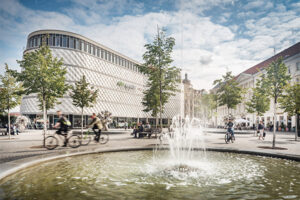This is why the government and other stakeholders should pay attention to it and give it support adequate to its importance. The restrictions imposed on retailers have a profound impact on the performance of shopping centers. With a total retail area of 2.6 million sq m, shopping centers represent a major part of the Czech retail segment and hold a key position, as seen from their very scope. In Cushman & Wakefield’s estimation, the government’s recent measures have resulted in the closing of up to 6 million sq m of retail space, of which almost 2 million sq m in shopping centers, which represents about 70% of their total retail space. malls also have a lion’s share in employment, and keeping employment rates as high as possible is principal for the functioning of the economy. The Czech retail sector employs almost 500,000 people, of which almost 100,000 in shopping centers.
Shopping centers and the entire retail sector also play a significant role in terms of the taxes supplied to the state budget. In terms of rental income, all the retail outlets that are currently closed – i.e., malls, high street shops and other retail schemes – amount to as much as CZK 3 billion per month under normal circumstances. This is another principal reason why it is necessary to adopt measures geared towards mitigating the impact on the sector.
To make sure that the currently stagnating economy revs up again, it is necessary to ensure that it can start up quickly. Retail has the best position for such a quick start. Once the restrictions are lifted, customers will want to make themselves happy again and they will start spending on smaller items such as fashion, shoes and accessories; they will want to buy food from restaurants and cafés. By contrast, they will be more careful with investments into more expensive items such as cars. In effect, retail – restaurants, shops and shopping centres – will have their say again as an in-demand daily product that attracts 300 million people annually.
The solution is in dialogue
In order to manage the situation in the retail environment and minimise the impact on the entire economy, all stakeholders – banks, tenants, landlords and the government – will have to act as partners seeking compromise solutions. Financing banks should focus their attention on the possibility of postponing or reducing loan payments for shopping centre landlords and/or tenants. Tenants should primarily take care of their employees, so that they are not compelled to dismiss them only to seek new ones later. In relation to landlords, they should make sure to observe their obligations under their lease agreements, seeking reasonable compromise solutions so as not to jeopardise the landlords who are indispensable for their own operations. Landlords should exert maximum effort towards setting up a sustainable strategy for rent and service charge collection so that their properties, shopping centers and tenants in them can maintain business continuity. The government should contribute towards all of the aforementioned by means of suitable supportive measures, states Cushman & Wakefield Czech Republic.





